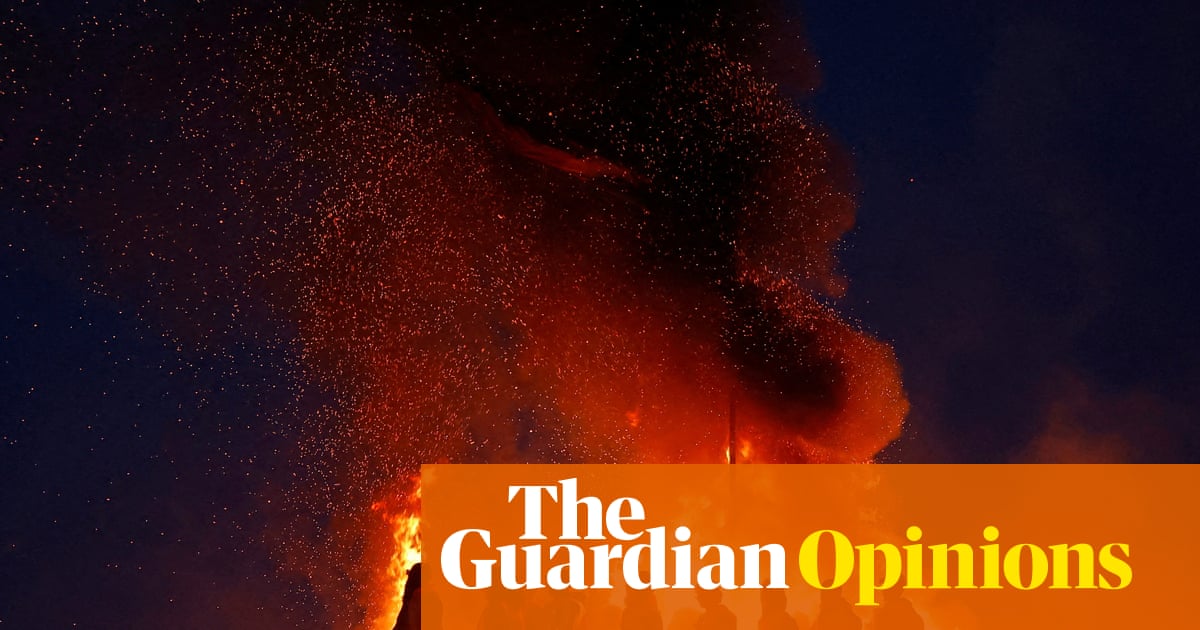The burning of an effigy of refugees on a boat to the cheers of a riled-up crowd in Moygashel, Northern Ireland shows where we are today. A decade has passed since Europe’s border crisis in 2015 and the shock caused by the image of Alan Kurdi, whose little body was found washed up on a Turkish beach. Sentiments of welcome and solidarity were short lived and have given way to a seemingly never-ending obsession in Europe with “stopping the boats” and reducing the number of migrant arrivals.
In the decade since Angela Merkel’s “we can do it”, we have become used to hearing that 2015 must not be allowed to happen again. Across Europe, politicians routinely vow to fight migration, “smash” smuggling gangs, ramp up border controls and build up detention and deportation capacities. A much-criticised migration pact was agreed upon while the annual budget of Frontex, the EU border agency, has seen a staggering increase, from €97.9m in 2014 to €922m in 2024. Entire border zones have become militarised and the guarding of borders has been “externalised” so that non-EU countries can prevent migration on Europe’s behalf.
In this past decade, we have also become desensitised to the inevitable consequences of such repressive policies in terms of human suffering and loss. Reports and images of people forced into Libyan torture and rape sites, described by German diplomats as “concentration camp-like” in 2017, no longer prompt a public outcry. Neither do the deaths of thousands in the Mediterranean every year or the criminalisation of activists who seek to avert mass drowning. Shipwrecks have become so common that they hardly make it into the news.
What does make the news, however, is the discourse on migration that characterises it as an emergency. Often dominating headlines, it has become a permanent feature, a sort of enduring state of exception that far-right forces capitalise on. Instead of offering alternative visions of migration, parties of the so-called “centre” or “mainstream” amplify such crisis talk, catering to simplistic control fantasies and offering one solution only: more borders.
Whether it’s the Christian Democrats or the Social Democrats in Germany, Labour in the UK or Emmanuel Macron’s government in France, mainstream parties seek to outdo parties to the right of them by pushing increasingly extreme and racist narratives, at times dangerously close to invasion and “great replacement” conspiracies.
In January, the French prime minister, François Bayrou, spoke of a “feeling of submersion” in view of the migrant presence in France. In May, the British prime minister, Keir Starmer, suggested that the UK was at risk of turning into an “island of strangers”. In June, the German chancellor, Friedrich Merz, claimed on Fox News that the past decade’s migration to Germany had led to “imported” antisemitism, so that fighting antisemitism meant fighting migration.
Promising to solve societal problems through repressive migration policies and more borders, these “centrist” or even “progressive” political leaders are selling a dangerous fantasy. In a world riven by war, genocide, economic disparity, a climate catastrophe and growing authoritarianism, borders will never succeed in averting people’s desire and need to migrate or flee. Indeed, the fantasy of borders is met, time and again, by reality: ongoing migration.
Distracting from the inability to address any of the structural issues underpinning migration and displacement, and in ever-greater desperation, we are being served “border spectacles” – performative but nonetheless violent and racist acts of exclusion, demarcating those who supposedly belong and those who do not. In the long shadow of the “crisis” of 2015, we see intersecting developments across Europe that should worry us.
First, a shift to the far right and growing authoritarianism. In Germany, the extremist Alternative for Germany (AfD) has comfortably established itself as the largest opposition party, at times leading in the polls, as do the Reform UK and National Rally parties in the UK and France respectively. Supposedly mainstream political parties have not only failed to stop the rise of the far right, they have contributed to mainstreaming their rhetoric and authoritarian policies.
More than that, by intensifying migration cooperation with repressive regimes outside Europe, they have contributed to the rise of authoritarianism elsewhere. Tunisia serves as one of many examples where Europe’s financial and political support has strengthened the security apparatus of its authoritarian leader, Kais Saied, who himself has spewed great replacement theories on migration.
Second, a shift away from the idea of a “post-national” community. The constant promise that borders will solve migration has reinforced the illusion that renationalisation is the answer. The departure of the UK from the EU, whose disastrous “taking back of control” in fact prompted an increase in migration post-Brexit, may be the most obvious example.
after newsletter promotion
However, throughout the EU, we see an increase in “borderisation” – the erection of barriers and border controls between member states – as a way to supposedly reclaim “lost” sovereignty. The very core of the European project – internal freedom of movement – is at risk and points to a growing estrangement from the idea of Europe as a post-national community.
Third, an assault on legal norms and institutions. The normalisation of anti-migration violence, including through mass pushbacks, has led to a clear erosion of human rights. Indeed, some EU member states have legalised human rights violations at borders while Greece decided to temporarily suspend asylum altogether this July. International institutions meant to protect refugees, including the UN refugee agency, have been under assault while we see a concerted hollowing out of international rights standards and the gradual death of asylum.
Even if the European obsession with borders fails to do what is desired – effective deterrence – it has real and dangerous consequences, for those seeking refuge and for us all. The burning of an effigy of refugees is what happens after a decade of dehumanisation. In the intervening years, many – from the supposed centre to the far right – have implanted a dangerous border fantasy that will continue to divide, hurt and kill.
